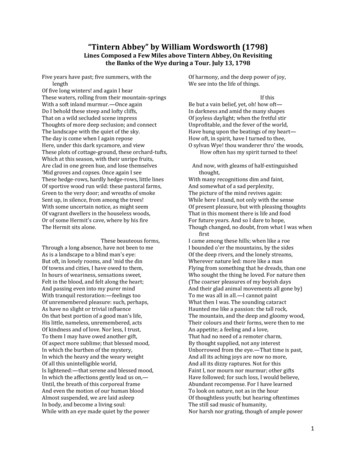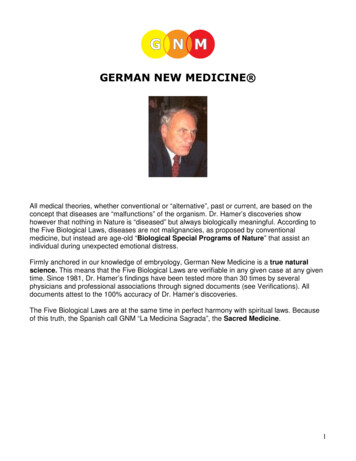
Transcription
GermanRevision TipsThe Edexcel Certificate in GermanBishop Wordsworth’sSchool1
Effective RevisionTo be effective, revision must be: Active - always work with a pen and paper, note down keyvocabulary and test yourself. Don’t just sit down and read thetextbook for a set period. Focus on tasks, not time. If you just readnotes you’ll only retain about 10% of the information. Organised - always ask yourself at the start of a study session"What do I want to have completed in this session?" Have a planfor what you want to cover by the end of the week. Try andorganise your German revision into the following topic areas:Topic AreasTopic area AHome and abroadLife in the town and rural lifeWeather and climateTravel, transport and directionsHolidays and tourist informationServices (eg telephone, bank, postoffice)Customs and religionEveryday life, traditions andcommunities in aGerman-speaking countryTopic area DThe modern world andthe environmentCurrent affairs and social issuesEnvironmental issuesThe media (eg TV, film, radio,newspapers)Information and communicationtechnology (eginternet, mobile phones, email)Topic area BEducation and employmentChildhoodSchool life and routineWork/careersFuture plansTopic area ESocial activities, fitnessand healthSpecial occasionsHobbies, interests, sports and exerciseShopping and money mattersAccidents, injuries, common ailmentsand health IssuesTopic area CHelping around the houseFood and drinksTypes of homeInformation about self, family and friendsHouse, home and dailyRoutines2
GrammarGrammarGenders & CasesPossessive adjectivesPrepositionsExampleder, die, das, den, des, demmein (my), dein (your), sein (his, its), ihr (her its, their), unser(our) and ihr (your polite)With the accusative: durch, für, gegen, ohne, um, wieder,entlangPage201202202202203With the dative: aus, außer, bei, mit, nach, seit, von, e phrasesIntensifiersPronounsRelative pronounsModal nsSubordinate clausesWith the accusative or dative (depending on movement): an,auf, hinter, in, neben, über, unter, vor, zwischenAdjective endings depend on the gender and the case of thenoun.Add –er to an adjective in German, e.g cooler or kreativer, tosay that something is cooler or more creative.Add –st or –est to an adjective, e.g. längst or interessantest tosay that something is ‘the longest’ or ‘the most interesting’.Manchmal, oft, nie, ab und zu, dann und wann, letztes Jahr usw.Use words to add emphasis!Ein bisschen, ein wenig, einfach, ganz, gar nicht, kaum, sehr,total usw.Ich, mich, mirDu, dich, dirEr, ihn, ihm usw .These mean ‘that’, ‘which’ or ‘who’. Relative clauses send theverb to the end:Das ist die Band, die ich gestern gesehen habe.That is the band that I saw yesterday.Können, mögen, müssen, sollen, wollen, dürfenThese normally need another verb to complete the meaning.This verb is sent to the end of the clause.Ich darf mit meinen Freunden nach London fahren.Present, perfect, imperfect, future, pluperfect, conditional.If there are several adverbs or adverbial phrases, they must bein this order.Wir fahren jeden Tag mit dem Rad durch die Stadt – Every daywe cycle through town.These do not change the word order!Und, aber, oder, dennThese words send the verb to the end of the clause:als, damit, dass, ob, obwohl, während, wenn, weilPassive Voice3203204204204205205206206207208209210210210
Getting started Where? Find a fixed place to study (a particular desk/room at home, a spot inthe library, etc.) that becomes firmly associated in your mind with productivework. All the equipment and materials you need should be within reach, andthe room should be well lit and ventilated, but not too comfortable! Turn yourroom into a positive learning environment. Keep books and notes on the deskto a minimum and decorate your walls with colourful notes and key vocab.Music is fine as long as it helps you to study and blocks out distracting noises.The very best sound to study to is thought to be that of Baroque composers orMozart. When? It’s impossible to ‘cram’ for a languages exam! ‘Little and often’ is thebest policy when it comes to German revision. You will work out a system thatsuits you, but many people find that three 30-40 minute sessions of Germanrevision per day is more effective than doing 2-3 hours at a time. For example,you could start off by learning some vocabulary in the morning, do somelistening before lunch and a few reading exercises in the afternoon. However,the most important thing is that you’re concentrating and working hard! What and how? Remember that it's all about being active and focused ontasks, not time! Know at the start of a session what you want to havecompleted by the end of the period. Make the tasks specific and realistic, notvague and large.4
Vocabulary You should aim to learn 5 words per day. Choose from the Minimum CoreVocabulary List on the GDrive. It’s best to spend 10-20 minutes in the morning revising them, then ask afriend or family member to test you on them at lunchtime or the end of the day. Make a list of all the words you find most difficult to remember and return tothese every couple of days. Write the words out and colour-code them (masculine nouns, feminine nouns,neutral nouns, plural nouns, verbs, adjectives, other words). Write them onPost-It notes (German on one side, English on the other) and stick themaround the house. Remember to revise how the words sound, not just how it looks. Usewww.dict.cc or www.leo.org to check the pronunciation. Just type in the wordand click on the speaker icon. If you’re a visual learner, try making a mind-map for each topic area or subtopic. Do this without your vocabulary list/dictionary first, and then allowyourself 2 minutes to look at your vocabulary list before adding to it.Useful Vocabulary Websites Languages Online http://www.languagesonline.org.uk/Online Dictionarieslook up individual words for pronunciation guidance and meaning. Leo www.leo.org Dict www.dict.cc5
Listening Completing past exam papers is the best way to revise for this exam. PastAQA, OCR and Edexcel Certificate papers are all available on the ODrive andonline. Build up your listening stamina! Start with one listening exercise, then build upto three or four per revision session Look at the question. What’s the topic? Which words can you expect to comeup? How could the examiner try and catch you out? Numbers can be tricky. Listen out for ages, dates, times and prices and notethem down. Always listen to a passage at least twice before committing to an answer. Tryand repeat sentences to yourself more slowly so the words sink in. Look at the transcript (if available) and write down any vocabulary you didn’trecognise. Add these words to your vocabulary list. Try listening to German radio for 5 minutes (increasing this with time) andmake notes in English. Do this with a friend and compare what you’ve written!Useful Listening WebsitesPast erman-j731-j031-j131-from-2012/EDEXCEL erials.html#filterQuery category:PearsonUK:Category%2FExam-materials6
Reading & Listening Questions BBC Bitesize - CSE-style Listening and Reading questions that you can mark online. Do theFoundation as well as the Higher activities. The Grammar section is useful for thoseannoying little words (try Pronouns and When, where and how much) Gut! ut.languageskills.co.uk/index.html - This site is available for free apart fromweekdays from 10am – 4pm. Listening and Reading exercises divided into topicareas. Languages Online http://www.languagesonline.org.uk/A variety of exercises. Grammar and topic units are good for a challenge!German Radio Radio www.listenlive.eu/germany.htmlComprehensive list of stations streaming online.7
Reading Look at the question first. What’s the topic? Which words can youexpect to come up? How could the examiner try and catch youout? Read the passage carefully. Identify key words, then look forthose tricky little words that can change the meaning of a sentence. Find the verbs. What tense are they in? Is the writer talking about the present(ich spiele), past (ich habe gegessen , ich aβ), future (Ich werde essen )or apossibility (Ich wϋrde essen, ich möchte essen)? If you’re reading a series of statements by several people, and the questionasks you to write the name of one of the people, try writing a brief summary ofwhat each person has said in English. Check your work thoroughly and write down any vocabulary you didn’trecognise.Useful Reading WebsitesPast erman-j731-j031-j131-from-2012/EDEXCEL erials.html#filterQuery category:PearsonUK:Category%2FExam-materials8
Reading & Listening Questions BBC Bitesize - CSE-style Listening and Reading questions that you can mark online. Do theFoundation as well as the Higher activities. The Grammar section is useful for thoseannoying little words (try Pronouns and When, where and how much) Gut! ut.languageskills.co.uk/index.html - This site is available for free apart fromweekdays from 10am – 4pm. Listening and Reading exercises divided into topicareas. Languages Online http://www.languagesonline.org.uk/A variety of exercises. Grammar and topic units are good for a challenge!9
SpeakingSection A: Presentation and discussion based on a single picture Maximum four minutes:– Presentation: maximum of one minute.– Discussion: maximum of three minutes.Students will give a presentation for up to one minute on a picture they havechosen. A discussion with the centre-appointed interviewer will then follow, for up tothree minutes.In order to prepare fully for this part of the exam, you will need to: Ensure that your 1 minute presentation is your BEST German. Learn your 1 minute presentation. Ensure that you have thought of answers to possible questions thatcould come up in the exam. Here are some examples: Was macht diese Person im Bild?Was trägt diese Person?Wie ist das Wetter?Wie sieht die Frau im Vordergrund aus?Welche Person findest du am interessantesten? Warum?Was haben die Personnen gemacht, bevor sie hierher gekommen sind?Was könnten sie als nächstes machen?Beschreib eine Person auf dem Bild.Was kann man noch auf dem Bild sehen?Wer sind diese Leute, deiner Meinung nach?Welche Person gefällt dir am besten auf dem Bild? Warum?Wie wäre das Bild vor zehn Jahren anders gewesen?Was sagen die zwei Leute im Vordergrund, meinst du?Was wird er/sie später machen?Warum hast du dieses Bild gewählt?Was sieht man auf der linken/rechten Seite?Was sieht man in der Mitte des Bildes?Was sieht man oben rechts/oben links?Was sieht man unten rechts/unten links?10
Section B: Two conversations Maximum six minutes.Students will take part in conversations with the centre-appointed interviewer on twoseparate topic areas. These topic areas will be different from the topic area chosenby the student for Section A.Section B will last up to a maximum of six minutes, with approximately threeminutes for each conversation.In order to prepare for this part of the exam, you will need to: Ensure that you have completed the highlighted questions of allspeaking banks (topics A-E). Use the corrected speaking banks for your revision. Practise asking and answering the questions.You could: Ask a family member or friend to ask you the questions (even if they don’tunderstand your answer). Write the questions on one side of a flashcard and the answer on the back.Pick up a flashcard and attempt an answer. You could then compare it withyour prepared answer. Record yourself asking and answering the questions. You could listen to thison your way to or from school.11
WritingWriting Task 1In the first extended writing task (question 3b), students will be required to writeabout 50 words in the target language, on a topic related to the preceding readingpassage. The response will be assessed for communication and content andknowledge and application of language.In order to prepare for this part of the exam, you will need to: Familiarise yourself with the mark scheme (available on the ODrive). Revise the OMIST structures (opinions, modals, intensifiers, subordinateclauses and tenses). Practise answering questions from past papers and include OMISTstructuresWriting Task 2For the second piece of extended writing (question 6), students will select onewriting task from a choice of three. They will be expected to write a continuousresponse, of about 150 words, in German. Students aiming at grade C and abovewill be expected to express opinions and to use a variety of structures, including arange of tenses (see page 3).The tasks for question 6 will encompass a variety of writing styles, such asnarrative, descriptive, discursive, and a range of formats such as a formal orinformal letter, a report, an article, a page from a diary, the script of a speech etc.In order to prepare for this part of the exam, you will need to: Familiarise yourself with the mark scheme (available on the ODrive). Revise the structures from page 3. Practise answering questions from past papers and include as manystructures as possible from page 3.12
Revision LogYou may find
Grammar Grammar Example Page Genders & Cases der, die, das, den, des, dem 201-202 Possessive adjectives mein (my), dein (your), sein (his, its), ihr (her its, their), unser (our) and ihr (your polite) 202 Prepositions With the accusative: durch, für, gegen, ohne, um, wieder, entlang











